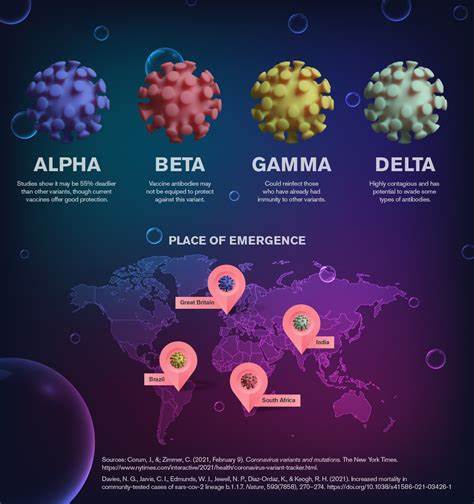Variants
Throughout the pandemic, multiple variants of the SARS-CoV-2 virus emerged, each with distinct features and dangers. Below we will delve into each of these variants including the original virus.
Original SARS-CoV-2 (Wuhan Strain)
The original SARS-CoV-2 strain, first identified in Wuhan, China, in December 2019, was the initial version of the virus responsible for the COVID-19 pandemic. This strain quickly spread globally, leading to widespread illness and significant disruptions to daily life. The original strain featured the spike protein that binds to the ACE2 receptor on human cells, facilitating viral entry and infection. The early stages of the pandemic saw high rates of transmission and mortality, prompting rapid development and deployment of vaccines. The original strain was characterized by its moderate transmissibility and severity compared to later variants, but its spread highlighted the need for global public health interventions and vaccine development.
Alpha (B.1.1.7)
The Alpha variant, also known as B.1.1.7, was first identified in the United Kingdom in September 2020. It quickly became a dominant strain due to its high transmissibility, estimated to be 50% more contagious than previous strains. Alpha carries several mutations in the spike protein, which is critical for the virus's ability to infect human cells. Studies suggested that this variant might cause more severe illness and increased risk of hospitalization and death compared to earlier variants. Vaccines remained effective against Alpha, but breakthrough infections did occur, underscoring the need for widespread vaccination and booster doses.
Beta (B.1.351)
First detected in South Africa in May 2020, the Beta variant (B.1.351) raised concerns due to its ability to partially evade immunity from previous infection or vaccination. This variant contains mutations that affect the spike protein, specifically the E484K mutation, which is associated with reduced neutralization by antibodies. Beta spread to numerous countries, leading to renewed public health measures and the development of modified vaccines. Despite these challenges, existing vaccines continued to provide significant protection against severe disease and death caused by the Beta variant.
Gamma (P.1)
The Gamma variant, also known as P.1, was identified in Brazil in November 2020. It contains a constellation of mutations, including three in the spike protein—K417T, E484K, and N501Y—that contribute to increased transmissibility and potential immune escape. Gamma led to widespread infections in Brazil, including in areas that had previously experienced high levels of infection, suggesting it could reinfect individuals who had recovered from earlier COVID-19 strains. Vaccines remained effective, though some reduction in efficacy was noted, highlighting the importance of global vaccination efforts and ongoing surveillance.
Delta (B.1.617.2)
The Delta variant, first identified in India in October 2020, became the most dominant and concerning variant globally by mid-2021. Delta is about twice as contagious as previous variants and has been associated with increased severity of illness. Its mutations allow for faster replication and greater binding affinity to human cells. Delta led to significant surges in cases, hospitalizations, and deaths worldwide, even in highly vaccinated populations. Booster doses of vaccines were introduced to enhance protection against this highly transmissible variant, which underscored the need for continued vigilance and adaptation of public health strategies.
Omicron (B.1.1.529)
The Omicron variant, first reported in South Africa in November 2021, quickly garnered attention due to its extensive number of mutations, particularly in the spike protein. These mutations allowed Omicron to partially evade immunity from previous infection and vaccination, leading to a rapid global spread. Omicron's high transmissibility resulted in unprecedented numbers of infections, but preliminary data suggested it might cause less severe disease compared to Delta. The variant prompted updates to vaccines and therapeutics to better address its unique characteristics, as well as reinforced the importance of booster doses and continued public health measures.
Sources:
- Cascella, Marco, et al. “Features, Evaluation, and Treatment of Coronavirus (COVID-19).” StatPearls [Internet]., U.S. National Library of Medicine, 18 Aug. 2023, Features, Evaluation, and Treatment of Coronavirus (COVID-19) - StatPearls - NCBI Bookshelf (nih.gov)
- Harth, Richard. “SARS-COV-2: A Theme and Variations.” SARS-CoV-2: A Theme and Variations | ASU News, 12 Aug. 2021, SARS-CoV-2: A theme and variations | ASU News







